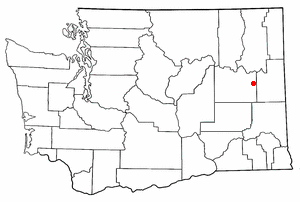Reardan, Washington
|
|
Reardan is a town located in Lincoln County, Washington. As of the 2000 census, the town had a total population of 608.
| Contents |
History
Reardan was officially incorporated on April 14, 1903.
Geography
Reardan is located at 47°40'9" North, 117°52'42" West (47.669057, -117.878471)Template:GR.According to the United States Census Bureau, the town has a total area of 1.2 km² (0.5 mi²). 1.2 km² (0.5 mi²) of it is land and 2.08% is water.
Demographics
As of the censusTemplate:GR of 2000, there are 608 people, 227 households, and 174 families residing in the town. The population density is 499.5/km² (1,285.2/mi²). There are 242 housing units at an average density of 198.8/km² (511.6/mi²). The racial makeup of the town is 93.91% White, 0.16% African American, 2.30% Native American, 0.00% Asian, 0.66% Pacific Islander, 0.16% from other races, and 2.80% from two or more races. 1.32% of the population are Hispanic or Latino of any race.
There are 227 households out of which 33.9% have children under the age of 18 living with them, 59.5% are married couples living together, 11.9% have a female householder with no husband present, and 23.3% are non-families. 21.6% of all households are made up of individuals and 6.2% have someone living alone who is 65 years of age or older. The average household size is 2.68 and the average family size is 3.06.
In the town the population is spread out with 28.9% under the age of 18, 8.1% from 18 to 24, 24.7% from 25 to 44, 26.6% from 45 to 64, and 11.7% who are 65 years of age or older. The median age is 37 years. For every 100 females there are 101.3 males. For every 100 females age 18 and over, there are 92.9 males.
The median income for a household in the town is $38,750, and the median income for a family is $44,167. Males have a median income of $32,279 versus $21,429 for females. The per capita income for the town is $18,610. 7.4% of the population and 7.3% of families are below the poverty line. Out of the total population, 12.8% of those under the age of 18 and 0.0% of those 65 and older are living below the poverty line.

